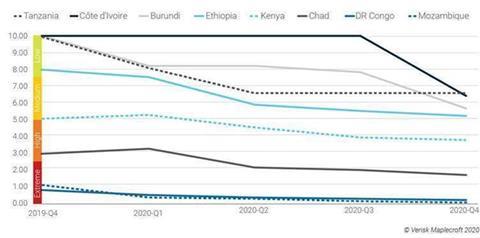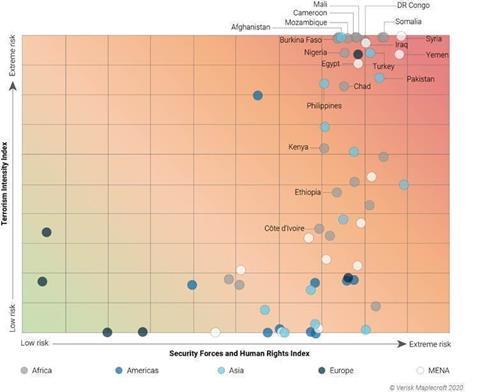Increased instances of human rights violations by security forces pose a major reputational risk for some firms
Violence in Africa’s terrorist hotspots is getting worse and the risk of attacks is rising in many countries across the region, including some previously considered safe, reveals the latest Terrorism Intensity Index from global risk consultancy Verisk Maplecroft.
The quarterly ranking of 198 countries shows sub-Saharan Africa is now home to seven of the world’s 10 riskiest locations, making it the worst performing region globally.
“Terrorist groups operating throughout sub-Saharan Africa are unlikely to lose their momentum in the next year,” says Alexandre Raymakers, Senior Africa Analyst at Verisk Maplecroft. “As the economic fallout from COVID-19 empties government coffers, governments will struggle to implement the comprehensive counterterrorism strategies required to contain these security threats.”
Companies should now invest more time and energy into identifying emerging threats and adopting precautionary measures to mitigate against future security risks. “For operators in Africa’s growing numbers of hotspots, this is now an imperative,” adds Raymakers.

Worsening outlook
With a further nine countries witnessing significant increases in the frequency and severity of attacks, the findings suggest that the reach and effectiveness of terrorist groups in Africa is growing. The last quarter alone saw a 13% rise in terrorist incidents across the continent compared to the previous period. The trajectory of these trends should be a major cause of concern for the region’s governments, as well as the mining and energy companies operating there, warns Verisk Maplecroft.
West Africa is currently shouldering the brunt of terror attacks. This mostly results from a significant deterioration of the security situation in the Sahel and an intensification of Boko Haram attacks in Chad, Nigeria and Cameroon.
Although the motivations, momentum and military capabilities of groups vary considerably, Verisk Maplecroft believes it likely that the extremist groups operating in West Africa are seeking to exploit the fragility of national governments weakened by the COVID-19 pandemic.
Risks to extractives companies rise
The deteriorating situation in West Africa represents a series of risks for extractive operators across the region – not only for the physical security of their assets, but also their personnel and distribution routes.
Mining companies operating in the Sahel are currently the most exposed – although terrorist groups have so far refrained from directly attacking major gold and uranium sites.
Jihadist groups operating in the three Sahelian states of Mali, Burkina Faso and Niger will likely continue to avoid directly attacking mining sites, instead focusing their resources on government and military installations as they seek to weaken government authority and extend their territorial control. But mining operators that depend on logistical routes from ports on the West African coast are likely to witness more ambushes and rent-seeking roadblocks once crossing into Burkina Faso and Niger in the year ahead.
Extremist groups operating in the Sahel are expected to expand their operations towards West African coastal states. This is likely to take the form of increased attacks on government and military positions along the borders of the central Sahel. However, the risk to mining and oil assets situated away from these locations is expected to remain negligible for the next year.

Human rights abuses committed by security forces a growing concern
Operators in states in the midst of intensifying terror campaigns, such as Burkina Faso, DR Congo, Mali and Mozambique, will continue to face significant challenges in mitigating the physical risk to their assets, and exposure to reputational risks associated with the actions of state security forces.
African governments’ preference for a security-heavy approach to counterterrorism carries significant risks as largescale military operations can often result in substantial human rights violations committed against the civilian population.
With limited funds at their disposal to address the socio-economic grievances fuelling these insurgencies, governments with terrorist groups operating in their territory will escalate their military operations. This, in turn, will lead to further instances of human rights violations by security forces in 2021 – keeping many of these countries firmly in the ‘extreme risk’ category of Verisk Maplecroft’s Security Forces and Human Rights Index.
However, as is the case for natural gas operators in Mozambique, companies will remain almost wholly dependent on governments to guarantee the security of their assets. Increased instances of human rights violations by security forces will therefore pose a major reputational risk for firms closely associated with host governments.







No comments yet